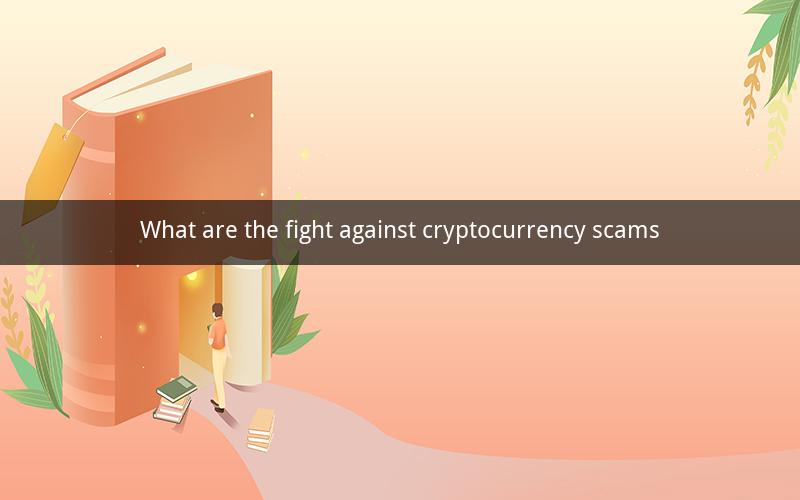
Directory
1. Introduction to Cryptocurrency Scams
2. Types of Cryptocurrency Scams
2.1 Ponzi Schemes
2.2 Phishing Attacks
2.3 Fake Exchanges
2.4 Pump and Dump
2.5 ICO Scams
3. How to Identify Cryptocurrency Scams
3.1 Unusual Promises
3.2 Lack of Transparency
3.3 Pressure to Invest
3.4 Unregistered Platforms
3.5 Poor Security Measures
4. The Role of Regulators in Combating Cryptocurrency Scams
5. Steps to Protect Yourself from Cryptocurrency Scams
5.1 Do Your Research
5.2 Use Secure Platforms
5.3 Be Skeptical of High Returns
5.4 Verify the Platform's Legitimacy
5.5 Keep Your Private Keys Safe
6. The Impact of Cryptocurrency Scams on the Market
7. Conclusion
Introduction to Cryptocurrency Scams
Cryptocurrency scams have become a significant concern in the rapidly growing digital currency market. With the increasing popularity of cryptocurrencies, fraudulent activities have also surged, targeting unsuspecting investors. This article aims to provide an overview of the fight against cryptocurrency scams, highlighting the types of scams, identification techniques, regulatory roles, and preventive measures.
Types of Cryptocurrency Scams
2.1 Ponzi Schemes
Ponzi schemes are fraudulent investment operations that promise high returns to new investors using funds from previous investors. These schemes rely on a continuous flow of new investors to sustain the illusion of profitability.
2.2 Phishing Attacks
Phishing attacks involve sending fraudulent emails or messages to deceive individuals into providing sensitive information, such as private keys or login credentials.
2.3 Fake Exchanges
Fake exchanges mimic legitimate cryptocurrency trading platforms, tricking users into depositing their funds, which are then stolen or frozen.
2.4 Pump and Dump
Pump and dump schemes involve artificially inflating the price of a cryptocurrency, followed by selling off the coins at a higher price, leaving investors with significant losses.
2.5 ICO Scams
Initial Coin Offerings (ICOs) have been a popular method for raising funds for new projects. However, many fraudulent ICOs promise unrealistic returns, with no real product or service to back up their claims.
How to Identify Cryptocurrency Scams
3.1 Unusual Promises
Scammers often promise unusually high returns or unrealistic growth rates, which should be a red flag for potential investors.
3.2 Lack of Transparency
Legitimate cryptocurrency platforms and projects are transparent about their operations, team members, and business model. A lack of transparency is a significant warning sign.
3.3 Pressure to Invest
Scammers often create a sense of urgency, pressuring individuals to invest quickly before missing out on the opportunity. This pressure can lead to impulsive decisions and potential losses.
3.4 Unregistered Platforms
Investing in unregistered or unregulated platforms can be risky, as these platforms may not adhere to proper security and regulatory standards.
3.5 Poor Security Measures
Scammers target individuals with weak security measures, such as using easy-to-guess passwords or failing to enable two-factor authentication. Ensuring robust security measures is crucial in protecting yourself from scams.
The Role of Regulators in Combating Cryptocurrency Scams
Regulators play a vital role in combating cryptocurrency scams by implementing laws and regulations to monitor and regulate the market. These regulations aim to protect investors and ensure market integrity.
Steps to Protect Yourself from Cryptocurrency Scams
5.1 Do Your Research
Before investing in any cryptocurrency or platform, conduct thorough research to ensure its legitimacy and reputation.
5.2 Use Secure Platforms
Choose reputable and secure cryptocurrency platforms that have robust security measures and a good track record.
5.3 Be Skeptical of High Returns
High returns often come with high risks. Be cautious of investments promising unusually high returns, as they may be fraudulent.
5.4 Verify the Platform's Legitimacy
Check if the platform is registered and regulated by the relevant authorities. Verify the platform's legitimacy through reviews and testimonials from other users.
5.5 Keep Your Private Keys Safe
Private keys are the keys to your cryptocurrency holdings. Keep them secure and never share them with anyone.
The Impact of Cryptocurrency Scams on the Market
Cryptocurrency scams have had a detrimental impact on the market, eroding investor confidence and causing significant financial losses. These scams can also lead to a negative perception of cryptocurrencies, hindering their widespread adoption.
Conclusion
The fight against cryptocurrency scams is a continuous process that requires the efforts of both regulators and individual investors. By understanding the types of scams, identifying warning signs, and taking preventive measures, investors can protect themselves from falling victim to fraudulent activities. It is crucial to remain vigilant and informed to ensure a secure and prosperous cryptocurrency market.
Questions and Answers
1. What is a Ponzi scheme, and how does it differ from a legitimate investment?
2. How can you identify a phishing attack in your email or message?
3. What are some common red flags of a fake cryptocurrency exchange?
4. How does a pump and dump scheme work, and how can you avoid it?
5. What should you consider when evaluating the legitimacy of an ICO?
6. What steps can you take to protect your private keys from scammers?
7. How can you verify the legitimacy of a cryptocurrency platform?
8. Why is it important to do your research before investing in cryptocurrencies?
9. How can regulators combat cryptocurrency scams effectively?
10. What is the impact of cryptocurrency scams on the overall market?